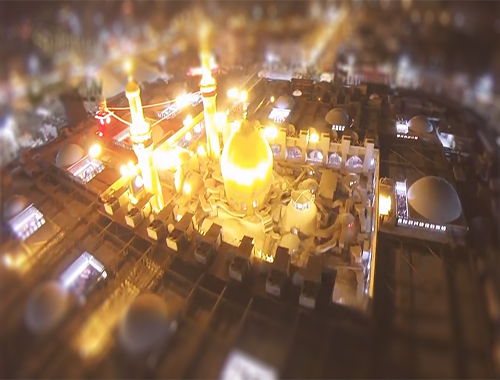Chapter 11-Degrees of Polytheism
- Details
- Hits: 4104
Chapter 11
Degrees of Polytheism
--------------------------------------------------------------------------------
As monotheism has degrees, so has polytheism. By comparing the two we can know both monotheism and polytheism better, for comparison of opposites makes the things clear. History shows that different kinds of polytheism have always existed side by side with monotheism preached by the Prophets.
I. Belief in the Plurality of Divine Essence
Certain nations have had belief in two (dualism), three (trinity) or more original and eternal sources independent of each other. They have believed that the world is multi-polar and multi-centred. What has been the root of such ideas? Is each one of these ideas a reflection of the social conditions of the people concerned? For example, when the people believed in two original and eternal sources and two original orbits of the world, their society was divided into two different segments, and when they believed in three sources and three gods, their social system was trilateral. In other words, in every case the social system has reflected on the minds of the people in the form of a doctrine. Is it also a fact that the Prophets preached monotheism only when the social system tended to be unicentered?
This view stems from a philosophical theory which we discussed earlier. According to this theory, spiritual and intellectual aspects of man and the moral and conventional tendencies of society such as sciences, law, philosophy, religion and art are subordinate to man's social systems, especially to his economic system, and have no independent position. We have already refuted this theory. As we believe in the intrinsic value of thinking, ideology and humanity, we consider such sociological views in respect of monotheism and polytheism to be baseless.
Anyhow, there is another question which should not be confused with this theory. Sometimes a religious creed is mis-used in a social system. For example, the idolatry system of the pagan Quraysh was a device of safeguarding the interests of the Arab usurers. The Abu Sufyans, the Abu Jahls and the Walids bin Mughirah did not have the slightest belief in the idols. They defended them to preserve the existing social system only. When the anti-usury monotheistic system of Islam emerged their defence of the idols took a serious turn. As the pagan usurers became apprehensive of their own ruin, they advanced the plea of the sanctity of the popular beliefs. The Holy Qur'an has alluded to this point at a number of places, especially in the story of Fir'awn and Prophet Musa. Anyhow it must be understood that this question is quite different from the view that economic system is the infrastructure of any doctrinal system and every intellectual system is the reaction of an economic and social system.
What the school of the Prophets vehemently rejects is the idea that every ideology is necessarily a crystallized form of the social desires which in turn are created by the economic conditions. According to materialistic theory, the monotheistic school of the Prophets is in itself a crystallized form of the social desires and was produced by the economic needs of the time of the Prophets. The development of the implements of production originated a number of social desires which were explained through the monotheistic idea. The Prophets were in fact the expounders of this social and economic need. There is a universal rule that every idea and every belief has an economic infrastructure. This rule applies to the idea of monotheism also.
As the Holy Qur'an believes that the innate nature of man is a basic dimension of his existence, and maintains that this innate human nature initiates a number of desires which can be met only by monotheism, it considers the monotheistic call of the Prophets to be meeting a great human need. It does not believe in any other infrastructure of monotheism, nor does it regard the class conditions as a factor compelling the emergence of any idea or a belief. Had the class conditions been the infrastructure of man's belief, everybody would have been bound to incline to the direction that his class position required. In this case there would have been no choice in the matter of belief for anybody. Neither the Fir'awns could be blamed nor their opponents could be praised, for a man can be blamed or praised only when he has a choice to be what he is not. Otherwise he can neither be blamed nor can he be praised. A negro or a white man cannot be blamed or praised for the colour of his skin. But we know that man is not bound to think in accordance with his class. He can revolt against his class interests, as Prophet Musa did, though he was brought up under Fir'awnic luxuries. This proves that the question of any infrastructure and superstructure besides depriving man of his humanity, is no more than a myth.
Anyhow, this does not mean that material and intellectual conditions do not affect each other. What is denied is their being infrastructure and superstructure respectively. Otherwise the Holy Qur'an itself says:
"Surely man is rebellious when he thinks that he is independent." (Surah 'Alaq, 96:6 - 7)
The Holy Qur'an accepts that the rich and the powerful play a special role in opposing the Prophets whereas the downtrodden and the underprivileged play their role in supporting them. But because of their human nature, they all are capable of accepting the truth.
From spiritual point of view the only difference is that one group in spite of its human nature, has to cross a great barrier before it may be persuaded to accept the truth for it has to relinquish its existing material gains and unjust distinctions, whereas the other group has no such obstacles. In the words of Salman, (the distinguished companion of the Holy Prophet) those who have a light burden are saved. Not only that, but the latter group has a positive incentive. Consequent to its accepting the truth its living conditions improve and its life becomes easier. That is why the majority of the followers of the Prophets has consisted of the underprivileged. Anyhow, the Prophets have always been able to recruit some of their followers from the privileged classes and have been able to persuade them to fight against their own class and its class interests. The Holy Qur'an does not think that the Fara'ina and the Abu Sufyans defended the polytheistic system of their times and provoked the religious sentiments of their people against Prophet Musa and the Last Prophet simply because they on account of their class position could not think of doing otherwise or because their class requirements had crystallized in the form of polytheistic beliefs. The Holy Qur'an maintains that they were perfidious. By virtue of their Divine innate nature they believed in Allah and realized the truth, but still they rejected it and opposed it. The Holy Qur'an says:
"They denied Our signs, though their souls acknowledged them." (Surah an-Naml, 27:14)
The Holy Qur'an describes their disbelief as the denial of what their hearts believed. In other words, their denial was a sort of revolution against their own conscience.
In this connection there exists a great misunderstanding. Some people maintain that the Holy Qur'an endorses the Marxist theory of historical materialism. We will discuss this question in detail when we undertake the study of society and history in another section of this book. This theory is neither in conformity with the actual reality of history, nor is defensible from scientific point of view.
Anyway, a belief in several sources is a belief in the plurality of the Divine essence, and is diametrically opposed to the belief in its unity. Advancing an argument in this connection the Holy Qur'an says:
"If there were therein deities besides Allah, then surely the heavens and the earth would have been disordered." (Surah al-Ambiya, 21:22)
A belief in the plurality of the Divine essence puts the holder of such a belief outside the pale of Islam which totally rejects this belief in every form of it.
II. Plurality of Creatorship
Some people acknowledge that Allah is peerless. They recognize Him to be the only source of the world. Nevertheless, as far as His creatorship is concerned, they associate some creatures with Him. For example, some of them hold that evils have been created by some other beings, not by Allah. This kind of belief is also tantamount to the belief in the plurality of creatorship, and is diametrically opposed to the doctrine of the unity of Divine actions. Anyhow, a belief in the plurality of creatorship has several degrees. Some of them do not amount to open polytheism and as such do not put the holders of the belief concerned outside the pale of Islam.
III. Plurality of Divine Attributes
This being a subtle question is not raised by the common people. Only some thinkers lacking deep insight have given a consideration to it. Among the scholastic theologians the Asha'irah believe in the plurality of the Divine attributes. As this belief does not amount to open polytheism, it does not put its holders outside the pale of Islam.
IV. Plurality of Worship
There have been many peoples which have worshipped pieces of wood, stone or some metal or they have worshipped an animal, a star, a tree or a river. Formerly this kind of polytheism was common. It is still found in several parts of the world. The plurality of worship is the opposite of the unity of worship. All the degrees of polytheism mentioned previously were the various kinds of theoretical polytheism. They may be described as false cognition. The plurality of worship is practical polytheism. It is a sort of false 'being' and false 'becoming'.
Anyhow, practical polytheism also has so many degrees. The highest of them is that which puts a man outside the pale of Islam. It is called plain polytheism. But there are many kinds of hidden polytheism. Islam in the course of its programme of practical monotheism fights against all of them. Certain varieties of polytheism are so minute and hidden that they can hardly be observed. The Holy Prophet has said: "Polytheism is more imperceptible than the crawl of an ant on a smooth stone in the darkness of night. The slightest degree of it is to prefer any act of injustice to an act of justice."
Religiousness is nothing but to love and hate for the sake of Allah. Allah says: "If you have love for Allah, then follow me so that He may love you." (Surah Ale Imran, 3:31)
Islam regards any kind of self-indulgence, love of position, honour and money as well as hero-worship as a sort of polytheism. In the story of the conflict between Prophet Musa and Fir'awn the Holy Qur'an describes the tyrannical rule of Fir'awn over the children of Isra'il as the imposition of devotion and slavery.
Prophet Musa is described to have said in reply to Fir'awn: "The favour for which you reproach me is that you have enslaved the children of Isra'il (and imposed on them the devotion to you)." (Surah ash-Shu'ara, 26:22)
It is evident that the children of Isra'il neither worshipped Fir'awn nor were they his slaves. They were only under his tyrannical domination as in another place Fir'awn himself is described to have said: "Surely we have full power over them". Still at another place Fir'awn is described to have said: "Their people (the people of Prophet Musa and Harun) are our slaves and devoted to us)". In this verse the word 'our' is significant. (See 7:127)
Even if we presume that the children of Israil were forced to worship Fir'awn, it is unimaginable that they worshipped all his people.
They were forced only to submit to and obey Fir'awn and his nobles.
In a sermon Imam Ali, describing the pitiable plight of the children of Isra'il under the tyrannical rule of Fir'awn, says: "The Fari'ina had enslaved them". He explains their enslavement in the following words: "They tortured them and made their life bitter. The children of Isra'i1 lived under most oppressive conditions and could find no way to escape from persecution and humiliation or to defend themselves". (See Nahjul Balagha)
The verse that promises vicegerency of Allah to the believers is the most express one in this connection. It says:
"Allah has promised to make those of you who believe and do the good deeds, successors in the land, as He had made those before them, and will establish their religion which He has chosen for them and change their fear into security. They will worship Me, and ascribe nothing as a partner to Me. Those who disbelieve henceforth are the wicked indeed." (Surah an-Nur, 24:55)
This verse shows that when a rightful government and Divine vicegerency are established, the believers get rid of the obedience of every tyrant. The verse says that they worship Allah alone and ascribe no partners to Him. This shows that from the viewpoint of the Holy Qur'an the obedience of the ruler is an act of the worship of Allah provided he is obeyed for the sake of Him. Otherwise it is a polytheistic act.
It is astonishing that forced obedience which is not morally regarded as an act of worship, is considered to be so from a social angle. The Holy Prophet says:
"When the number of the children of al-'As (ancestor of Marwan bin Hakam and most of the Umayyad caliphs) reaches thirty, they will seize the property of Allah and turn it into their private property, will enslave the bondmen of Allah, and will interfere in His religion".
Here the Holy Prophet has hinted at the oppression and despotism of the Umayyads. Evidently the Umayyads did not ask people to worship them, nor did they make them slaves of theirs. They only imposed on them their despotic rule. The Holy Prophet through his Divine foresight calls this position enslavement and a sort of polytheism.
Boundary Between Monotheism and Polytheism
What constitutes the line of demarcation between monotheism and polytheism (including both theoretical and practical forms of them)? Which idea is monotheistic and which is polytheistic? What kind of action constitutes practical monotheism and what kind of it constitutes practical polytheism?
Is it polytheistic to believe in the existence of anything other than Allah? Does the unity of His essence require us not to believe that there exists anything in any form besides Him not even as His creation? (a sort of ontological monism)
It is obvious that the created things are the work of Allah. They cannot be considered to be His rivals. Allah's creations are the manifestation of His exuberant power. A belief in the existence of a created thing as a thing created by Allah is, not contrary to monotheism. It is rather complementary to it. Hence the line of demarcation between monotheism and polytheism cannot be the existence or the non-existence of anything other than Allah.
Does a belief in the causation of the created things amount to polytheism or the plurality of creatorship? Does a belief in the unity of the Divine work necessarily imply that we should reject the system of causation and ascribe every effect direct to Allah? For example, should we believe that fire has no role in burning, water has no role in quenching thirst, rain has no role in making plants grow and medicines have no role in curing, and that it is Allah direct who burns, quenches thirst, makes the plants grow and cures the diseased. Is it true that the presence or absence of other factors makes no difference? At the most it can be said that Allah usually performs His acts in the presence of certain factors. If a person has the habit of putting a cap on his head when he wants to write a letter, it cannot be said that the presence or absence of a cap has any effect on his letter writing. The only thing is that he does not like to write a letter without a cap. According to this view, the same is the nature of the presence and the absence of the things called causes and factors. Should we believe otherwise, we will be ascribing partners to Allah in His work. That is the view of the Asha'irah and the Predestinarians.
This view again is not correct. Just as a belief in the existence of a created thing is not tantamount to the belief in the plurality of the Divine essence, but is complementary to the belief in the oneness of Allah, similarly a belief in the causation system is not tantamount to the belief in the plurality of creatorship. As the created things are not self-existing, similarly they are not independent with regard to their effectiveness. As all existing things depend on Allah for their existence and effectiveness, there is no question of the plurality of creatorship. The belief in the causation system is actually complementary to the belief in the creatorship of Allah. It certainly would have amounted to polytheism if we believed that the created things were independent from the viewpoint of their effectiveness, or believed that the relation between Allah and the world was that of a manufacturer and the things manufactured. A vehicle initially needs a manufacturer to manufacture it, but when it is completed, it operates according to its own mechanism. Even if the maker dies, the vehicle will continue to work. Should we think that the relation of the natural factors, such as water, rain, energy, heat, earth, plants and man to Allah is of a similar nature, as sometimes the Mu'tazilah tend to think, the idea would certainly lead to polytheism.
The created things depend on their Creator for their effectiveness as much as they depend on Him for their origin, existence and survival. The world is His creation and a blessing from Him. It depends on Him totally. Hence the effectiveness of the created things is actually the effectiveness of Allah and their creativeness is His creativeness and an extension of His work. Even it may be said that to describe the belief that the created things have a role in the affairs of the world as a polytheistic idea, is in itself a polytheistic idea, for it implies an unconscious belief in the independence of the existing things, as is betrayed by the presumption that a belief in their effectiveness will amount to the belief in two centres. Anyhow, a belief or an unbelief in the causation of the things besides Allah is not the line of demarcation between monotheism and polytheism.
Is a belief in the supernatural power of an existing thing whether an angel or a man such as an Imam or a Prophet polytheistic, while a belief in the power and effectiveness of a Prophet or an Imam etc. within the normal limits is not so? Similarly is it also a polytheistic idea to have a belief in the power and effectiveness of a man who has died, for a dead man is apparently nothing more than inorganic matter? Obviously from the viewpoint of natural laws inorganic matter has neither consciousness, nor power nor will. As such to believe that a dead man has perception or to greet a dead man, to show respect to him, and to call and implore him for anything, all should be polytheistic acts, for they mean ascribing supernatural power to a being other Allah.
Similarly it also should be polytheistic to believe that the earth of a particular place is effective in curing diseases or that prayer is granted at a particular place, for such a belief is tantamount to believing in the existence of a supernatural power in a lifeless thing. As all that is natural, is identifiable, experimentable and perceptible, to believe in the effectiveness of the things cannot be polytheistic as supposed by the Asha'irah, but it is certainly polytheistic to believe in the supernatural power of the created things.
Existence has two sectors: physical and metaphysical. The metaphysical sector is the exclusive domain of Allah, while the physical sector is the exclusive domain of the created things or is a domain common to Allah and the created things both. A number of functions having a metaphysical aspect, such as giving life, causing death, providing means of living etc., along with some normal and ordinary functions, fall within the exclusive domain of Allah. That is the position as far as theoretical monotheism is concerned.
As for practical monotheism, any spiritual, that is non-physical, heed paid to a being other than Allah with a view to establish a spiritual relation with him, to draw his attention or to seek response from him, constitutes polytheism, and amounts to worshipping him. As the worship of a being other than Allah is neither allowed by reason nor by Islamic law, it puts such a worshipper outside the pale of Islam. Further, the nature of any rite, involving such a heed is not different from that of the rites performed by the idolaters in respect of their idols. The performance of such rites means to ascribe metaphysical power to the personage involved in them (for example an Imam or the Holy Prophet). The above is the view that is held by the Wahhabis and the semi-Wahhabis of our age.
In our times this view has gained considerable currency and in certain circles it is considered to be a sign of clear thinking.
But from the monotheistic point of view, it is as polytheistic as the theory of the Asha'irah. In fact it is the worst theory from the viewpoint of the unity of creatorship and the unity of Divine work.
While refuting the theory of the Asha'irah, we said earlier that they denied the causation system on the plea that a belief in the effectiveness and causation of the created things would amount to a belief in the existence of several sources and origins besides Allah. We pointed out that the things could originate sources only if they were self-existing and were independent of Allah. Asha'irah appear to have unconsciously believed in some sort of the independence of the created things. This belief is evidently polytheistic as it amounts to the denial of the unity of the Divine essence. Anyhow, they did not realize the consequences of their theory. They wanted to affirm the unity of creatorship, but unwittingly ended in supporting the plurality of the essence.
The same criticism is applicable to our own semi-Wahhabis. They also unwittingly accord a kind of self-independence to the created things, for they think that to believe in any supernatural factors is tantamount to believing in a power rival to Allah. These people overlook the fact that the supernatural deeds of a being whose entire existence depends on Allah and who has no independent status of his own, are in fact attributable to Allah before being attributed to him. He is nothing more than a medium through which Divine favour is conveyed. Is it polytheistic to believe that the angel Jibril is the medium of revelation and knowledge, Mikail is the medium of the means of living, Israfil is the medium of Resurrection and 'Izrail is the medium of carrying away the souls?
From monotheistic point of view, this theory leads to the worst kind of polytheism, for a belief in it amounts to a sort of the division of work between the Creator and the created. According to this theory the supernatural deeds fall within the exclusive domain of Allah and the natural deeds fall either within the exclusive domain of the created or are common to the domains of the Creator and the created. To believe in an exclusive domain of the created means a belief in the polytheistic idea of the plurality of work. Similarly to believe in a common domain is another kind of polytheism.
Contrary to the current conception, Wahhabism is not only a doctrine opposed to Imamate, but it is also opposed to monotheism and humanity. It is anti-monotheistic because it believes in the division of work. As explained above Wahhabism is a sort of disguised polytheism. It is anti-human in the sense that it does not give any credit to human talent and ability which have made man superior even to the angels. As expressly mentioned in the Holy Qur'an, man is the vicegerent of Allah and the angels were ordered to prostrate themselves before him. But Wahhabism still want to degrade man to the level of a wild animal.
Further, to make such a distinction between the living and the dead as to say that the dead are not alive even in another world and that the entire personality of man consists in his body, which turns into inorganic matter after his death, is a materialistic and ungodly idea. We will deal with this question later when we discuss about the Day of Judgement.
To make a distinction between the unknown mysterious effects and the known effects of the things and to regard the first as metaphysical in opposition to the second, is another kind of polytheism.
Now we can comprehend what the Holy Prophet meant when he said that infiltration of polytheism into belief is so quiet and imperceptible as the crawl of an ant on a smooth stone in the darkness of night.
The fact is that the dividing line between monotheism and polytheism is the relationship between Allah on the one hand and man and the world on the other. This relationship is that of "from Him" and "to Him". In the theoretical monotheism the line of demarcation is "from Him". "We all are from Allah".
So long as we recognize every truth and every existing thing to be having the quality of being from Him in its essence, its attributes and its work, we identify it correctly from the monotheistic point of view. It is immaterial whether it has one single effect or several effects or no effect at all, and whether it has or has not any supernatural effects. Allah is not the Lord of the metaphysical world alone. He is the Lord of the whole world. He is as close to the physical world as to the metaphysical. He is with everything and sustains everything. If a thing has any metaphysical aspect, that does mean that it has an aspect of Godship. As we said earlier, in accordance with Islamic conception of it, the world has the nature of being "from Him". The Holy Qur'an in a number of verses ascribes to the Prophets such miraculous acts as bringing the dead to life and restoring the sight of the born blind. Anyhow, it always adds the phrase: "With His will". This phrase indicates the nature of these acts and shows that they were from Him. Nobody should have the notion that the Prophets were self-dependent. A belief in any existence that is not "from Him" is polytheistic. Similarly a belief in the effectiveness of an existing thing, if that effectiveness is not "from Him" is again an act of polytheism. It is immaterial whether its effect is supernatural like creating the earth and the heavens or is so trivial as overturning a leaf.
In the case of practical monotheism the line of demarcation between monotheism and polytheism is 'to Him'. 'We shall return to Him', as the Holy Quran says.
A heed, whether spiritual or otherwise, made to an existing thing with a view to proceed towards Allah and not as a goal in itself, is a heed to Allah. The existing things are to be regarded only as signs and milestones on the way towards Him, Who alone is the goal and destination.
The Prophets and the Imams have been described as 'the main routes and the straight path, the sign-posts for the people, the light houses in the land, the guides to the way of Allah, the preachers of His message and the proclaimers of what He likes'. (Ziyarat Jamiah)
Hence the question is not that to seek the intercession of the Imams, to invoke them or to expect them to perform supernatural deeds is polytheistic. The real question is something else. First we should be certain whether or not the Prophets and the Imams have actually gained such a proximity to Allah that they have been blessed with supernatural powers and qualities. The Holy Qur'an indicates that Allah has favoured some people with such a position.
Another question is whether the people who seek the intercession of the Imams and the saints, visit their tombs and make supplication to them, have or have not from monotheistic point of view a correct understanding of what they do. Do they have the idea of 'to Him', in their mind, when they go to the shrines? Or are they oblivious of Him and think that the Imam or the saint whose shrine they visit is himself the goal. There is no doubt that most of the people instinctively have Allah in their mind. Some people, may be totally devoid of the monotheistic view. They should be reminded of it. Anyhow, there is no reason why visiting the shrines should be declared polytheistic.
The third point is that it is a form of polytheism to glorify and praise any being other than Allah in a manner that is worthy of the absolutely perfect and self-existing being. Allah alone is far above every defect and deficiency. It is He alone to Him all praise is due. He alone is All-powerful. To ascribe such attributes by means of words or action to anyone other than Allah is polytheistic. We have already discussed earlier what actions constitute worship and adoration.
Fidelity and Earnestness.
The cognition of Allah automatically influences the entire personality, spirit, morals and the conduct of man. This influence is proportional to the degree of his faith. The stronger the faith of a man the more intense the influence of the cognition of Allah on him.
The effect of the cognition of Allah on man has many degrees and stages, and according to their variation human perfection and man's proximity to Allah varies. These degrees are called the degrees of fidelity and earnestness.
As stated earlier, when we turn to Allah and worship Him, we show that He alone deserves obedience and we absolutely submit ourselves to Him. This kind of worship and the expression of total submission is not permissible in respect of anyone except Allah. As for the question how far we are earnest in our total submission to Allah and non-submission to any other being, that depends on our faith. Evidently all are not alike from the viewpoint of fidelity and earnestness.
Some people make such a progress that inwardly and outwardly they are controlled only by the commandments of Allah. No personal desires can swerve them this side or that side, nor can any human being bring them under his absolute control. They allow their desires to operate only in accordance with the pleasure of Allah. Obviously to seek the pleasure of Allah is the only way to attain perfection. Such people obey their parents, their teachers etc. for the sake of Allah and only within the limits allowed by Him. Some go even a step further. Their sole love is Allah. They love His creatures for being His signs and mementos. A few go even further from this stage also. They do not see anything except Him and regard everything else as His manifestation. They find Him in every thing.
Imam Ali says: "I have never seen anything, but saw Allah before it or along with it".
If a worshipper tries to give a concrete shape in his life to what he communicates to his Allah in the course of his worship, he attains perfection and reaches the stage of fidelity.
For a worshipper his worship is a real contract by the conditions of which he has to abide in his life. This contract has two main conditions. The first is freedom from the obedience of every one and every thing else including his own desires, and the second is a complete submission to the commandments of Allah and their unqualified acceptance.
For a worshipper the correct way of worship is the basis of his education and spiritual development. It is a systematic instruction in liberal-mindedness, self-sacrifice, love of Allah, love of humanity, association with the right-thinking people, virtuousness and service to mankind.
It is clear from what we have said that Islamic monotheism does not accept any motive other than gaining the pleasure of Allah. The evolutionary reality of man and the world is "to Him". Anything which is not oriented to Him is false and opposed to the natural evolutionary course. From Islamic point of view whatever a man does, whether he does it for himself or for others, is for the sake of Allah. It is wrong to say that 'for the sake of Allah' is identical with 'for the sake of humanity' and that to do a thing for the sake of Allah minus humanity is nothing but mysticism and pedagogism.
From the viewpoint of Islam the only way is that of Allah and the only objective one should aim at is to please Him. Anyhow, the way of Allah passes through the people.
To do a thing for oneself is egoism, to do a thing for the people is idolatry, and to do a thing for Allah and the people both is polytheism and dualism.
The true monotheism is to serve oneself and others for the sake of Allah. According to Islam the monotheistic way is to begin things in the Name of Allah, not in the name of the people or jointly in the Name of Allah and the people both.
An interesting point may be derived from the Surah al-Ikhlas of the Holy Qur'an. The point is that there is a difference in being mukhlis, that is to do things purely for Allah, and being mukhlas, that is to be pure in oneself.
Unity and Singleness of the World
Does the entire universe that is the temporal and spatial creations of Allah really form one unit? Does the oneness of Allah, that is the unity of His essence, the unity of His attributes and the unity of His work, necessarily require that His creation also should have some sort of unity. If the universe is a well-knit and coherent unit, what is the nature of its coherence? Is it organic in the sense that the various parts of the universe stand in the same relation to the whole of it as the various limbs to a body, or is it mechanical and the various parts of the universe are like the various parts of a machine?
We have discussed the nature of the unity of the world in our book, Principles of Philosophy. In another book of ours, named Divine Justice we have stated that nature is an indivisible whole, the non-existence of a part of it being tantamount to the non-existence of the whole of it, and that the annihilation of the so-called evils will amount to the annihilation of the entire nature.
The modern philosophers, especially the great German philosopher Hegel has supported the view that the relation between nature and its different parts is that of a body and its limbs. Anyhow, the acceptance of the arguments he has put forward depends on the acceptance of all the principles of his philosophy. The supporters of dialectic materialism have followed him in holding this view. They defend it vehemently under the principles of reciprocal effect and interdependence of contradictories, and claim that in nature the relation between a part and the whole is organic, but when they put forward their arguments, they can prove only mechanical relationship. The fact is that on the basis of materialistic philosophy, it is not possible to prove that the world as a whole is like a body, and the relation of its parts to the whole is that of the limbs to a body. Only the Divine philosophers who have from the time immemorial held that the world is the macro-man and man is the microcosm, have visualized this relationship correctly. Among the Muslim philosophers Ikhwanus Safa (the Brethren of Purity) have laid much stress on it. Even more than the philosophers the Muslim mystics look at the universe as one unit. According to their view the whole cosmo is one single manifestation of the Divine Reality.
The gnostics call all that is besides Allah "sacred overflow' and talking in similitudes say that it is like a cone, the pointed head of which having contact with Allah is simply imperceptible and the base of which is immensely extensive and outstretched.
At present we do not propose to deal with any of these statements of the philosophers and the Muslim gnostics, and again take up the point we were discussing earlier. As we said, the reality of the world is 'from Him' and 'to Him'. It is an established fact that the world is not merely a moving and a flux reality, but is in itself an embodiment of movement and fluxion. This is a fact which Islamic philosophy alone has been able to prove. In the course of the study of motion it has also been established that the unity of the beginning, the unity of the end and the unity of the course confers a sort of unity on the movements. Therefore, in view of the fact that the universe has one beginning, one end and one evolutionary course, it is obvious that it is a sort of one single unit.
Visible and Invisible
According to the Islamic conception of the cosmos, the world is an aggregate of the visible and the invisible things. This conception divides the universe into the world of the visible and that of the invisible. The Holy Qur'an itself has repeatedly mentioned the visible and the invisible, especially the invisible. To believe in the invisible is an article of faith in Islam. The Holy Qur'an says:
"Those who believe in the unseen." (Surah al-Baqarah, 2:2)
"With Him are the keys of all that is hidden. None but He knows them." (Surah al-An'am, 6:59)
There are two kinds of the invisible or the hidden: the relatively hidden and the absolutely hidden. The relatively hidden is that thing which a person cannot perceive by means of his senses because it is at a long distance from him. For example, for a person who is in Tehran, Tehran is visible and Isfahan is invisible. But for him who is in Isfahan, Isfahan is visible and Tehran is invisible.
In the Holy Qur'an at several places the word 'ghayb' (invisible or hidden) has been used in this very relative sense. The Holy Qur'an says: "These hidden (unknown) events which We have revealed to you, were neither known to you nor to your people so far." (Surah Hud, 11: 49)
Evidently the events of the people of the past are 'hidden' as far as the present day people are concerned, though they were 'visible' for those who witnessed them.
At another place the same word 'ghayb' has been applied by the Holy Qur'an to the realities which are absolutely invisible. There is a difference between the realities which are perceptible through the external senses, but are not visible on account of great distance, and the realities which are imperceptible and invisible because they are not corporeal and finite. Evidently when the Holy Qur'an says that the faithful believe in what is invisible, it does not mean what is relatively invisible, for everybody, irrespective of his being faithful or infidel believes in that. Again when it says that with Allah alone are the keys of all that is hidden, it means all that is absolutely hidden, for the meaning of the verse does not fit in with what is relatively hidden. The same is the case with those verses in which the visible and the invisible have been mentioned together. For example, the Holy Qur'an says:
"He is the knower of the visible and the invisible; and He is the Beneficent, the Merciful." (Surah al-Hashr, 59:22)
This verse also refers to the absolutely invisible and not to the relatively invisible.
How are these two worlds, the visible and the invisible related to each other? Has the visible world any boundary line beyond which the invisible world is situated? For example, is it that from the earth to the sky there is the visible world and i beyond that there is the invisible world? Obviously such a conception is vulgar. Should we suppose that there is a physical boundary line which separates the two worlds, that would mean that both the worlds are physical and material. The relation between the visible and the invisible cannot be explained in material terms. At the most what we can say to make their relationship understandable is that they stand in almost the same relation as a main body and a branch of it or a body and its shadow. In other words this world is a reflection of another world. The Holy Qur'an indicates that whatever there is in this world is a 'lowered form' of the things existing in another world. What has been called 'keys' in the verse quoted above, has been named 'stores' in another verse. The Holy Qur'an says:
"There is not a thing but with Us are the stories thereof; but We do not send it down except in an appointed measure." (Surah al-Hijr, 15:21)
It is on this basis that the Holy Qur'an regards everything, even stones and iron, as having been sent down. "We send down iron." (Surah al-Hadid, 57:25)
This does not mean that all things including iron have been shifted from a higher place to a lower place. In fact, whatever there is in the world, has its 'root' and its 'essence' in another world, the world of the invisible and whatever there is in that world, has its 'shadow' and a 'lowered form' of it in this world.
The Holy Qur'an makes it obligatory to have faith in the unseen. The same point is described in another way, when faith in the angels, the Prophethood and the revelation is enjoined.
The Holy Qur'an says: "The Messenger believes in that which has been revealed to him by his Lord, and so do the believers. They all believe in Allah, His angels, His Books and His Messengers." (Surah al-Baqarah, 2:285)
"He who disbelieves in Allah, His angels, His Books, His Messengers and the Last Day, certainly has gone far astray." (Surah an-Nisa, 4:136)
In these two verses the Books of Allah has been mentioned separately. Had they signified the Scriptures revealed to the Prophets, the mention of the Messengers would have been enough. That is an indication that here the books signify some different kind of realities. The Holy Qur'an itself has referred to some hidden truths and given them the name of 'an explicit book' 'a protected tablet', 'the mother book', 'a written book' and 'a hidden book'. A faith in this sort of metaphysical books is a part of Islamic creed.
The Prophets have come basically to enable mankind to have, as far as possible, a general view of the entire creational system. The creation is not limited to the perceptible and palpable things which come under the purview of the experimental sciences. The Prophets want to raise the outlook of man from what is perceptible to what is understandable, from what is visible to what is invisible and from what is finite to what is infinite.
Unfortunately, the wave of the materialistic and limited thinking which has risen from the West has spread to such an extent that a section of the people insists to bring down the vast and high Islamic conception of the world to the level of the perceptible and material things.
This World and the Next World
Another basic principle of the Islamic conception of the cosmos is the division of the world into the present and the next. What we said earlier concerning the visible and the invisible pertained to a world preceding this world - a world giving form to this world. Though from one angle the next world is the invisible world and the present world is visible, yet in view of the fact that the next world is subsequent to this world and it is a world to which man returns, it deserves to be dealt with separately. The invisible world is that from where we have come and the next world is that to which we shall go. That is what Imam Ali meant when he said:
"May Allah bless him who knows from where he has come, where he is and where he will go".
Imam Ali did not say: May Allah bless him who knows from what he has come, in what he is and to what he will go. Had he said so, we would have taken that to mean that we have been created from dust, we will go into dust and we will be raised again from dust. In that case he would have referred to the following Qur'anic verse which says:
"From it (the earth) We created you, to it We will return you and from it We will bring you forth once again." (Surah Ta Ha, 20:55)
What Imam Ali has said here refers to some other verses of the Holy Qur'an and represents a higher conception. He meant "the world from where we have come, the world in which we are at present and the world to which we shall go".
From the viewpoint of the Islamic conception of the world, like the visible and the invisible, the present and the next world also have an absolute, not a relative sense. What is relative is the deeds which are performed. If something is done to satisfy one's own desire, it is a worldly act. In many cases if the same thing is done for the sake of Allah and to gain His pleasure, it becomes the next worldly act. We are going to discuss this world and the next in detail later under the heading 'Eternal Life'.











